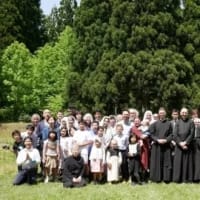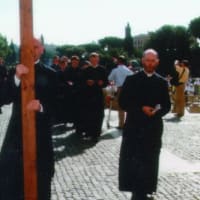アヴェ・マリア!
フィリピン司教評議会はラテン語ミサに関する教皇様の手紙を歓迎する
願わくは、日本カトリック司教評議会も教皇様の手紙を同じように歓迎して受け入れて下さいますように!
聖母の汚れ無き御心よ、我らのために祈り給え!
フィリピン司教評議会会長ラグダメオ大司教の「トリエント」ミサについての声明
STATEMENT ON THE "TRIDENTINE" MASS
私たちは尊敬と感謝を持って最近の「トリエント」ミサに関する教皇ベネディクト十六世の使徒書簡を心から歓迎します。これは私たちのためにラテン語によるトリエント・ミサの置かれている状況を明らかにしてくれます。・・・・
We fully welcome with respect and appreciation the recent Apostolic Letter of Pope Benedict XVI on the "Tridentine" Mass. It clarifies for us the status of the Tridentine Mass in the Latin Language.
In accordance with the Apostolic Letter ("Motu proprio") entitled "Summorum Pontificum" of Pope Benedict XVI, the celebration of the so-called Tridentine Mass, which is in the Latin language, as approved by Blessed Pope John XXIII in 1962 continues to be fully permissible as an extraordinary form of the Mass. The Tridentine Mass was never forbidden or abrogated.
The so-called "New Mass" which was introduced after the Second Vatican Council and approved by Pope Paul VI in 1970 has become more popular among the people because it allowed the use of some approved adaptations, including the use of the popular languages and dialects. It became the ordinary form of the Mass, widely celebrated in the parish churches.
When may the Tridentine (Latin) Mass be celebrated? According to the letter of Pope Benedict XVI, it may be celebrated by catholic priests of the Latin Rite:
a) in private masses,
b) in conventual or community mass in accordance with the specific statutes of the Congregation,
c) in parishes upon request of the faithful and under the guidance of the bishop (in accordance with Canon 392).
In such Masses, however, the readings may be given in the vernacular.
This permission given by Pope Benedict XVI means that the Mass in Latin and in accordance with the formula of the Council of Trent, hence Tridentine, with the celebrant's back to the faithful may be celebrated, as it was never forbidden or abrogated. For new priests, this will require formation in the Latin Mass.
Now, we are instructed that in the liturgy of the Mass, there is the ordinary form which is that approved by Pope Paul VI in 1970 after the Vatican II; and there is the extraordinary form - the Tridentine (Latin) Mass which is that approved by Blessed Pope John XXIII in 1962. The two forms will have their way of leading the faithful to the true worship of God in prayer and liturgy; and may even be a factor for unity in the Church.
+Angel N. Lagdameo
Archbishop of Jaro
President, CBCP
JULY 9, 2007
============
CBCP welcomes Pope's Letter on Latin Mass
CBCP welcomes Pope’s Letter on Latin Mass
MANILA, 09 July 2007 “We fully welcome with respect and appreciation the recent Apostolic Letter of Pope Benedict XVI on the “Tridentine” Mass. It clarifies for us the status of the Tridentine Mass in the Latin language,” said CBCP President Archbishop Angel Lagdameo in a statement released today.
Pope Benedict XVI issued Saturday a motu proprio Pastoral Letter entitled “Summorum Pontificum" saying that Tridentine Mass approved by Pope John XXII in 1962 “continues to be permissible as an extraordinary form” of celebrating the Mass.
In the same statement, Lagdameo said that the mass being practiced today by Catholics throughout the world is the “new mass” which was introduced after the Second Vatican Council and approved by Pope Paul VI in 1970, which has become the ordinary form of the mass and more popular among the people because it allows the use of some approved adaptations, including the use of popular languages and dialects.
Supporting the Pope’ Pastoral Letter, Lagdameo stressed that the Tridentine mass has never been forbidden and abrogated but should be celebrated by priests of the Latin Rite only in private masses, in conventual or community celebrations, or in parishes when requested by the faithful but under the guidance of the local bishop.
Lagdameo further said that permission by Pope Benedict to celebrate the Tridentine mass is given on condition that it should follow the formula of the Council of Trent.
But news priests, he said, will require formation before celebrating the Latin mass. (Roy Lagarde)
============
ブログランキング <= クリックで応援して下さい。兄弟姉妹の皆様の応援を感謝します!
============
【推薦図書】
聖骸布の男 あなたはイエス・キリスト、ですか?
脳内汚染からの脱出
願わくは、日本カトリック司教評議会も教皇様の手紙を同じように歓迎して受け入れて下さいますように!
聖母の汚れ無き御心よ、我らのために祈り給え!
STATEMENT ON THE "TRIDENTINE" MASS
私たちは尊敬と感謝を持って最近の「トリエント」ミサに関する教皇ベネディクト十六世の使徒書簡を心から歓迎します。これは私たちのためにラテン語によるトリエント・ミサの置かれている状況を明らかにしてくれます。・・・・
We fully welcome with respect and appreciation the recent Apostolic Letter of Pope Benedict XVI on the "Tridentine" Mass. It clarifies for us the status of the Tridentine Mass in the Latin Language.
In accordance with the Apostolic Letter ("Motu proprio") entitled "Summorum Pontificum" of Pope Benedict XVI, the celebration of the so-called Tridentine Mass, which is in the Latin language, as approved by Blessed Pope John XXIII in 1962 continues to be fully permissible as an extraordinary form of the Mass. The Tridentine Mass was never forbidden or abrogated.
The so-called "New Mass" which was introduced after the Second Vatican Council and approved by Pope Paul VI in 1970 has become more popular among the people because it allowed the use of some approved adaptations, including the use of the popular languages and dialects. It became the ordinary form of the Mass, widely celebrated in the parish churches.
When may the Tridentine (Latin) Mass be celebrated? According to the letter of Pope Benedict XVI, it may be celebrated by catholic priests of the Latin Rite:
a) in private masses,
b) in conventual or community mass in accordance with the specific statutes of the Congregation,
c) in parishes upon request of the faithful and under the guidance of the bishop (in accordance with Canon 392).
In such Masses, however, the readings may be given in the vernacular.
This permission given by Pope Benedict XVI means that the Mass in Latin and in accordance with the formula of the Council of Trent, hence Tridentine, with the celebrant's back to the faithful may be celebrated, as it was never forbidden or abrogated. For new priests, this will require formation in the Latin Mass.
Now, we are instructed that in the liturgy of the Mass, there is the ordinary form which is that approved by Pope Paul VI in 1970 after the Vatican II; and there is the extraordinary form - the Tridentine (Latin) Mass which is that approved by Blessed Pope John XXIII in 1962. The two forms will have their way of leading the faithful to the true worship of God in prayer and liturgy; and may even be a factor for unity in the Church.
+Angel N. Lagdameo
Archbishop of Jaro
President, CBCP
JULY 9, 2007
============
CBCP welcomes Pope's Letter on Latin Mass
CBCP welcomes Pope’s Letter on Latin Mass
MANILA, 09 July 2007 “We fully welcome with respect and appreciation the recent Apostolic Letter of Pope Benedict XVI on the “Tridentine” Mass. It clarifies for us the status of the Tridentine Mass in the Latin language,” said CBCP President Archbishop Angel Lagdameo in a statement released today.
Pope Benedict XVI issued Saturday a motu proprio Pastoral Letter entitled “Summorum Pontificum" saying that Tridentine Mass approved by Pope John XXII in 1962 “continues to be permissible as an extraordinary form” of celebrating the Mass.
In the same statement, Lagdameo said that the mass being practiced today by Catholics throughout the world is the “new mass” which was introduced after the Second Vatican Council and approved by Pope Paul VI in 1970, which has become the ordinary form of the mass and more popular among the people because it allows the use of some approved adaptations, including the use of popular languages and dialects.
Supporting the Pope’ Pastoral Letter, Lagdameo stressed that the Tridentine mass has never been forbidden and abrogated but should be celebrated by priests of the Latin Rite only in private masses, in conventual or community celebrations, or in parishes when requested by the faithful but under the guidance of the local bishop.
Lagdameo further said that permission by Pope Benedict to celebrate the Tridentine mass is given on condition that it should follow the formula of the Council of Trent.
But news priests, he said, will require formation before celebrating the Latin mass. (Roy Lagarde)
============
ブログランキング <= クリックで応援して下さい。兄弟姉妹の皆様の応援を感謝します!
============
【推薦図書】
聖骸布の男 あなたはイエス・キリスト、ですか?
脳内汚染からの脱出



















